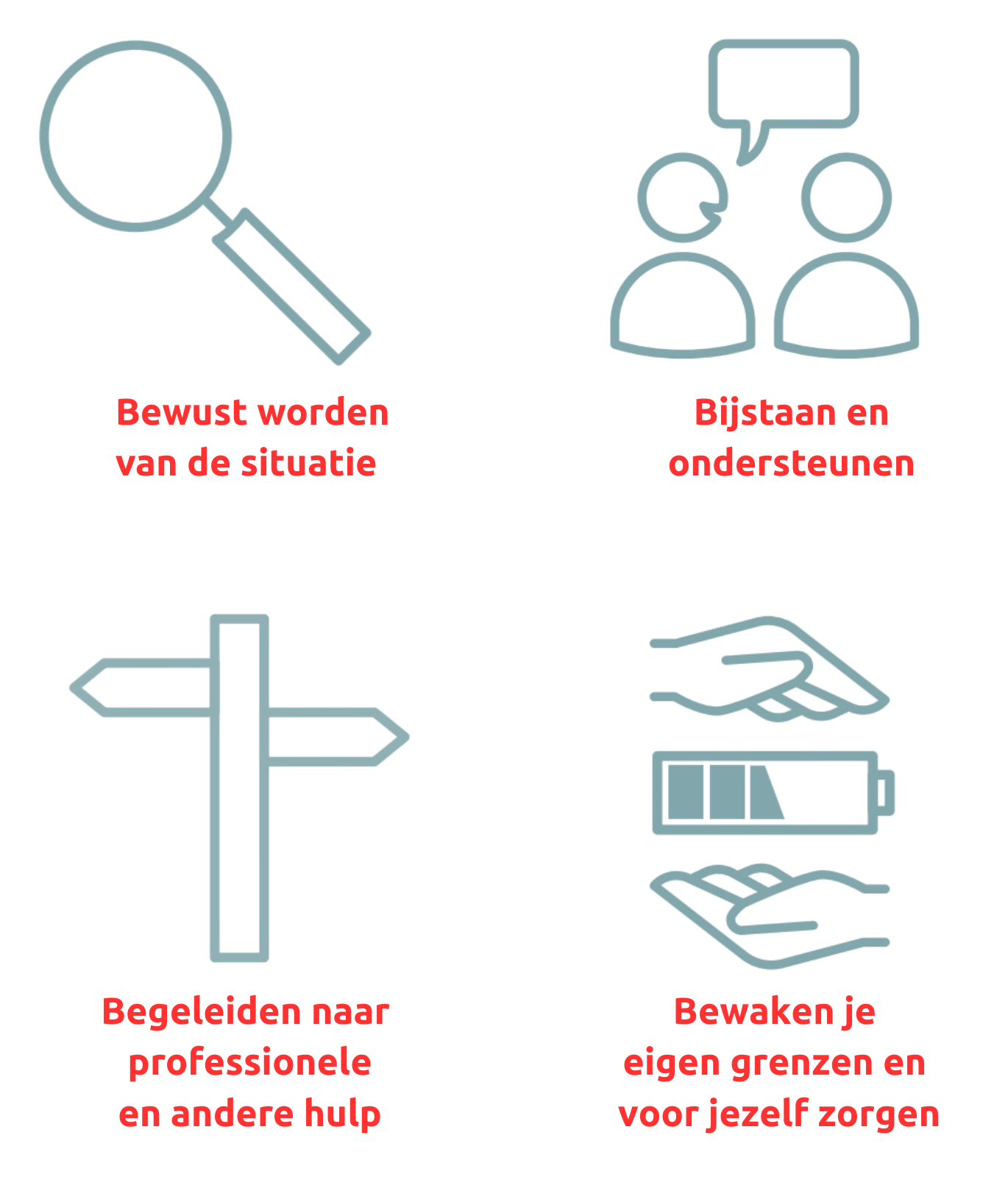
Tips for host families refugee conflict Ukraine: how to deal with mental health issues?
You are about to welcome refugee(s) following the conflict in Ukraine. Admirable that is. Probably you also find yourself with lol questions. And ond no doubt the people you will be sheltering have been through an intense, not obvious journey. At first, adrenaline will give them the urge to survive. As soon as they have found shelter and peace with you, mental difficulties may arise. Red Cross-Flanders gives you tips on how to deal with this and to offer them initial psychological support.
In 4 steps: how to offer initial psychological help?
How can you provide first aid to someone who is struggling psychologically? There are 4 basic four actions. Often it is not immediately clear if something is going on and what. What can you do or say if necessary? The steps below will give you some guidance. We have deliberately chosen here for a concise summary. If you need more background, be sure to consult our Hold on to You app where you can find more information about the first basic actions.

1. Become aware of the situation: are any of your guests showing any of these signs?
It is very important that you assess the mental health of your guests at all times. You are in good mental health if you can cope well with the many challenges in your daily life and feel this way yourself. Because of everything your guests have been through, it is quite possible that their carrying capacity has taken a huge dent. It is precisely this carrying capacity that protects us from developing mental health problems.
You can play a hugely important role in this by being there for your guests. Your support can literally make things more bearable and prevent worse psychological problems. If your guest finds it too difficult - no matter how hard you try - and a well-intentioned conversation is no longer enough, you have to intervene. We are here to help you in recognizing signs that may indicate mental health problems.
Recognizing psychological problems
It is important to be mindful of the general symptoms of mental health problems.
- Change in thinking
- Problems with attention and concentration
- Problems with learning and memory
- Problems with planning and organizing
- Trouble thinking clearly
- Persistent negative expectations or beliefs regarding self, others, the world
- Change in feelings
- Pronounced difficult and fine feelings
- Less room for fine feelings
- Strongly fluctuating feelings
- Flat feelings
- No feelings
- Changes in appearance and behavior
- Change in posture and movement
- Change in way of speaking
- Change in appearance and behavior
- Change in eating habits
- Change in sleep habits
- Tantrums
- Irritability
- Change in relationships with others
- Difficulty understanding and sympathizing with others
- Changes in content of conversations and way of interacting with others
- Withdrawing from social contacts
- Exhibiting behavior that is harmful to others
Recognizing a crisis
Accumulated psychological problems can possibly lead to a psychological crisis. A psychological crisis is when someone finds themselves in (an accumulation of) stressful situation(s) to which they are unable to adapt sufficiently and as a result of which they develop serious psychological symptoms. The symptoms are so severe that they completely disrupt daily life. The drop that causes a crisis need not be large.
Possible characteristics of a mental health crisis are:
- Endangering oneself or others
- Concrete thoughts of suicide
- Attempted suicide
- Serious self-injury
- Aggression
- Severe abuse of medication/alcohol/other drugs
- Sudden, extreme changes in feelings/behavior
- Panic attacks
- Runaway
- Crying
- Extreme euphoria
- Confusion, losing sense of reality.
- Hallucinations
- Feeling alienated from the world or from own body
Do you recognize any of these symptoms?
- Then ensure the safety of yourself, the person and others.
- Provide rest.
- Talk clearly and distinctly.
- Listen to their story and offer support.
- Get professional help if necessary. Call the Emergency Center 112.
Recognizing possible trauma
Your guests may have been through a lot lately. They may be or have been effectively traumatized by it. It is perfectly possible that your guest may seem completely ok at the start, but that their behavior changes the longer they stay with you. Be extra attentive to the issues below.
- Reliving the trauma
- Via looking up information and/or watching footage
- Intrusive thoughts, images, feelings and memories
- Nightmares
- Flashbacks
- Through drawing or repetitive play
- Avoidance of trauma
- Avoiding painful memories, thoughts and feelings - internally
- Avoiding places, people, objects - external
Recognizing mental health problems in children
Of course, it is possible that you will also care for children. They, too, may experience psychological problems. Below is a list of general signs you should be alert for in children. It is important that you pay attention to the impact on their functioning. Every child can be tired, but if this has a clear effect on their functioning, there is often more to it.
- Fatigue
- Weak, physical discomfort
- Irritable
- Difficult to begin assignments
- Sweats a lot and quickly
- Says in advance that who can't do it
- Cries quickly, anxious behavior
- Lots of sighing, breathing problems
- Eat too much/little
- Concentration problems, nervous
- Restless
- Feels unhappy
- Regressive behavior
- Aggressiveness
- Restlessness, emotional instability
- Sleep problems
- Separation anxiety
- Bedwetting
- Frequent crying
- Withdrawn behavior / isolation from activities / friends
- Psychosomatic complaints
- Learning and concentration problems
- Id.
- Attachment problems
2 Assist and support: how do you support your guest who is struggling?
If you recognize any of the above signs, then it is important to deal with them properly. Your guest may have experienced a shocking event. They react to it both psychologically and physically. Some reactions you may not expect. Do not take it personally.
How do you support your guest when they are struggling?
- Engage in the conversation.
- Provide time and space to talk.
- Stay calm.
- Listen without judging.
- Be aware of your own body language.
- Offer support and show empathy.
- Respect privacy but do not promise secrecy.
- Limit giving advice, but look for a solution together.
- Offer practical support, but limit it.
- Encourage them to tell about his problems to people close to them.
- If the person does not want to talk right away, respect this.
- Stay present.
 Don't go on and on about the effective traumatic event yourself. Reliving a traumatic event can lead to (further) traumatization.
Don't go on and on about the effective traumatic event yourself. Reliving a traumatic event can lead to (further) traumatization.
How do you support a child who is struggling?
- Try to stay calm yourself or unwind together.
- Answer questions in a simple but honest way. Do not avoid the topic, but follow the child's pace.
- Provide distractions: toys, creative opportunities, as well as great memories.
- Provide structure in daily life (e.g., going to bed at the same hour, eating, etc.).
- Limit media exposure; e.g., watch news together 2 set times a day.
How do you support a child during panic or severe reactions?
- Ensure safety.
- Try to stay calm yourself.
- Keep in mind that reactions result from an overstressed stress system. The child or adolescent is not always in control of it.
- Sit at eye level.
- Bring the child into the here and now: call their name, take a walk together, refer to calming things in the environment.
- Name the reaction you see (e.g., very scared, angry, sad).
- When the child has calmed down, ask what you can do if that were to happen again.
3. Escort to professional and other help
Your guests come from a war situation and may have been through a few things. Don't hesitate to seek professional help if necessary.
Where can you turn for professional help?
- Overview of mental health and social services by region
- GP
- Psychologist
- Center for general welfare work (CAW).
- Public center for social welfare (CPAS).
- Youth counseling center
- Therapists for Youth (TEJO).
Of course, there are many other organizations that can help. Talk to your doctor or take a look at our app Hold on.
4. Guarding your own limits and taking care of yourself
We understand all too well that you want to put the interests of your guests first for a while now. You want to be there for them and support them to the best of your ability. We absolutely recommend that too, but taking care of another person starts with taking care of yourself. Be sure to keep the tips below in mind:
- Acknowledge and accept your own feelings.
- Distance yourself in a timely manner.
- Don't take what someone says or does when they are going through mental health problems personally.
- Find support for yourself with family, friends or someone else.
- Limit your own responsibilities.
- Exercise enough and eat, drink and sleep healthily.
- Make enough time for yourself and what you enjoy, do what relaxes and recharges.
- Take advantage of our self-care plan.
App Holding
If you notice that you are not feeling great and would like to read more about the signals you can watch out for, you can visit our app Houvast. It offers you tips for getting a grip, articles with more information about signals you can notice in yourself, self-help tips such as me-time moments, a diary and more. Be sure to take a look at the self-care section to get ideas on how to take good care of yourself.
Self-care plan
Keep a self-care plan. This will help you stay healthy in dealing with the situation.
